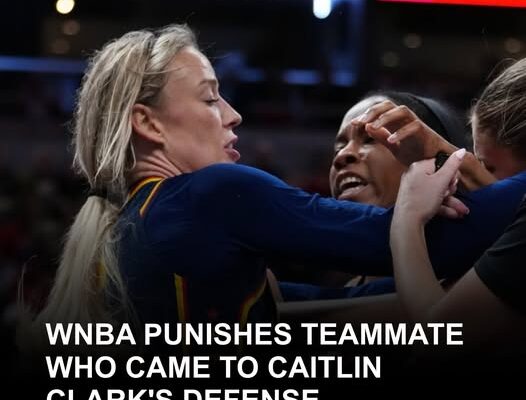Tension Boils Over in Connecticut as WNBA Fines Sophie Cunningham and Marina Mabrey Following Flagrant 2 Fouls and On-Court Altercation.
The recent WNBA clash in Connecticut between the Indiana Fever and the Chicago Sky has taken a dramatic turn as the league handed down fines to Sophie Cunningham and Marina Mabrey after a heated altercation that resulted from back-to-back Flagrant 2 fouls. What began as a competitive matchup quickly descended into chaos, capturing the attention of fans, analysts, and league officials alike. The fallout from this incident is now being felt across the league, raising questions about player conduct, league discipline, and the intense emotions that come with elite-level competition.
The spark came during the second half of a tightly contested game that had playoff implications for both the Fever and the Sky. Tensions had been simmering for most of the night. Physical play, aggressive drives, and chippy exchanges had already characterized the matchup. Then came the moment that would tip it over the edge. Indiana’s Sophie Cunningham, recently added to the Fever roster and already known for her feisty, hard-nosed style of play, delivered a hard foul on Chicago’s Marina Mabrey as she attempted to cut toward the basket. The referees immediately reviewed the play and assessed Cunningham with a Flagrant 2, leading to her automatic ejection from the game.
What happened next made matters worse. As Cunningham was being escorted off the court, Mabrey charged toward her, shouting and attempting to confront her directly. Teammates from both sides intervened, and within seconds, the scene became a full-blown on-court scuffle. Pushing, shouting, and bench players rising in anticipation of something more escalated the situation. Officials scrambled to separate the players and restore order. After several minutes, play resumed, but the damage had already been done.
Following a post-game review, the WNBA announced fines for both Cunningham and Mabrey. While Cunningham was punished for the initial Flagrant 2 foul, which was deemed “excessive and unnecessary,” Mabrey was cited for “escalating the situation and unsportsmanlike conduct.” The league stopped short of issuing suspensions, a decision that has sparked debate among fans and commentators. Some believe suspensions would have sent a stronger message about maintaining discipline, while others argue that the fines are a fair response considering the emotional intensity of the moment.
This is not the first time Cunningham has found herself at the center of controversy. Throughout her WNBA career, she has developed a reputation as a fiery competitor who doesn’t shy away from physical contact. Her passionate style has earned her both admiration and criticism. Supporters say she brings toughness and energy to her team, qualities that can galvanize a locker room. Critics argue that her physicality sometimes crosses the line, as it arguably did in this case.
For Marina Mabrey, the situation is equally complex. Known for her scoring ability and fearless attitude, Mabrey is one of Chicago’s most emotionally driven players. Her reaction to Cunningham’s foul may have been fueled by the frustration of a tight game and the perception that the referees weren’t offering adequate protection. While her instincts to stand up for herself are understandable, the league clearly felt her attempt to confront Cunningham only made matters worse.
The reactions from both teams after the game were telling. Fever head coach Christie Sides defended Cunningham’s character, stating that the foul, while aggressive, wasn’t malicious. She emphasized that Cunningham was simply trying to make a play on the ball and that her intentions weren’t to injure Mabrey. However, Sides also noted that players must be smarter in high-stakes moments and that emotions must be kept in check.
Sky head coach Teresa Weatherspoon, meanwhile, spoke passionately about the need to protect players from unnecessary contact. She praised Mabrey’s competitive spirit but acknowledged that the situation needed to be handled better by everyone involved. Weatherspoon emphasized the importance of responding through performance rather than confrontation, especially in a league that continues to grow its audience and expand its influence.
The incident comes at a critical time for the WNBA, which is enjoying unprecedented media attention and a surge in popularity thanks to a new wave of young stars, increased viewership, and a rapidly growing fan base. With that growth comes increased scrutiny. Every on-court incident is magnified, every foul dissected, and every response judged. The Cunningham-Mabrey altercation is the latest example of how the league must balance the passion of its athletes with the professionalism expected at the highest level.
In the days since the fines were announced, both players have addressed the incident publicly. Cunningham issued a statement via social media expressing regret that her actions contributed to the altercation. She reiterated that her intention was to play hard and help her team win but acknowledged that the result was not reflective of the sportsmanship she strives for. Mabrey, for her part, also released a statement, thanking her teammates and fans for their support while expressing frustration at what she felt was a dangerous play. She said she hoped the league continues to take player safety seriously.
Both players will move forward, but the incident has left a lasting impact. For Indiana, losing Cunningham in that moment disrupted their rhythm and may have cost them momentum. For Chicago, the emotional toll of the incident may linger in future matchups. The WNBA’s decision to stop short of suspensions also sends a clear message: while passion is part of the game, there are lines that cannot be crossed, and escalation is just as punishable as the initial action.
The media reaction has been swift and polarized. Some pundits have praised the league for acting decisively and avoiding overreaction, while others argue that this was a missed opportunity to send a stronger message about accountability and professionalism. Talk shows, podcasts, and social media platforms have been abuzz with analysis, with many fans taking sides. Cunningham supporters point to the physical nature of basketball and argue that flagrant fouls are part of the game. Mabrey defenders see her reaction as a justified response to a dangerous play.
Beyond the surface, this incident highlights broader themes within professional sports, particularly women’s sports. As the WNBA continues to break new ground, it must also grapple with the challenges of rapid growth. Increased visibility brings increased pressure. Players are not only athletes but role models, brand ambassadors, and cultural icons. Incidents like this remind everyone involved—players, coaches, and league officials—of the high stakes and the need for composure in the heat of battle.
The league has promised to continue monitoring player conduct and to implement further educational measures aimed at conflict de-escalation and emotional regulation. There’s already talk of enhanced training sessions for players and coaching staffs on how to manage high-intensity situations. The WNBA Players Association has also weighed in, stating that while the fines are unfortunate, they hope the league will continue to work with players to ensure a balance between competitive fire and mutual respect.
As for the fans, this incident has only deepened engagement. Clips of the altercation have gone viral, discussions are widespread, and the rivalry between Indiana and Chicago now has an added layer of intensity. Ticket sales and TV ratings for upcoming rematches are likely to benefit from the added intrigue. In the world of sports, controversy often fuels interest, and this situation is no exception.
Moving forward, both Cunningham and Mabrey have the opportunity to use this moment as a catalyst for growth. Each is a vital piece of her respective team’s ambitions, and both are capable of bouncing back stronger. The real story may not be the fines or the scuffle, but how these two athletes respond, how they lead, and how they channel their competitive energy in a way that uplifts their teams and elevates the league.
While chaos may have reigned briefly on the court in Connecticut, it has sparked an important conversation across the WNBA. One that touches on sportsmanship, passion, accountability, and the evolving standards of professional women’s basketball. It’s a reminder that the league is growing—not just in size and revenue, but in complexity. And with that growth comes both the challenge and the responsibility to uphold the integrity of the game.



